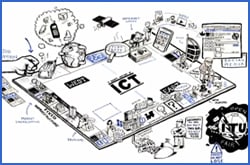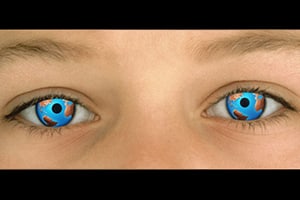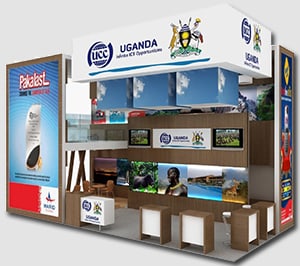
Ahead of my Futurist Keynote speech at ITU Telecom World 2013 in November, I’d like to share a few thoughts on the disruptive trends poised to utterly transform the way we live, communicate and do business.
We are entering an era of information tsunamis: mind-boggling global data torrents , all-pervasive social-local-mobile (SoLoMo) connectivity, widespread ‘wikilikean’ transparency expectations (both B2C as well as B2B), rapid changes in interface technologies (AR, gestures, voice-control, nanotechnologies,bionics, AI etc), the hyper-realtime speed of information and media, and of abundant consumer choice in pretty much every sector of commerce and business.
Almost all business – including those in the hereto lesser-impacted B2B sectors such as banking, energy and raw materials – will become socially-driven (especially those based on digital products). Peer to peer recommendations, ratings, endorsements and all kinds of are already widespread but will essentially replace customer relationship management in the near future; the same goes for hiring and general HR needs (witness the rise of LinkedIn as a global HR resource pretty much eliminating the need for traditional headhunters). Since most social business is essentially data-sharing- and permission-driven, data is indeed becoming the new oil. The global and radical empowerment of ‘the people formerly known as consumers’ via cheap, powerful and ubiquitous SoLoMo technologies will be a huge game changer (yes, both an opportunity and threat) – and this will really get cooking when another 3 billion in the BRICS and other emerging markets come online. You thought it was confusing now – just give it another 2 years.
There will be data, data, enormous big data, everywhere. Data levels, depth and sheer frequency will reach previously unimaginable pace and proportions, and anyone / anything having to do with data-mining and management will be in very high demand. The consequence: curation, context, relevance, timeliness and overall sense and meaning-making as well as totally intuitive pattern recognition (i.e. the human part of the data deluge) will become infinitely more important than mere access to lots of information, content or data. Meaning will actually trump noise.
In the dawning knowledge- and experience society, we are quickly shifting from downloads to flows, and from stuff to bits, both in terms of technology as well as in terms of our user behaviour and actual consumption habits. Information is no longer (just) stored and kept for later, rather, it’s accessed and filtered and sifted, when and where and how it’s needed, in realtime, realplace, real-life. Technology will also move from relying on search, files and pages to reading, understanding and enabling flows and streams (cloud, social, local, mobile).
And then there’s the Internet of Things, of course, and pervasive machine-to-machine connectivity is becoming very real, very fast. Wireless networks, RFIDs and NFC technologies will seamlessly and ubiquitously connect people (if not their actual brains then their devices) to things to machines, and vice versa, and artificial intelligence and ultra-smart electronic agents will glue all this together.
The Internet is gradually becoming an extension of our brains; and mobile devices are already our external brains. Is the next stop the actual integration of the Internet in our bodies (iris implants etc), cyborgs after that… singularity, transhumanism? Not sure what to think of that, really -are you?













 We’ve completely redesigned the web pages for this year’s event – as you’ll notice immediately if you’ve visited us before. And it’s not just about changing how it looks – it is part of our commitment to the one conversation that matters. Because this is just not an empty strapline. It’s our statement of intent and purpose.
We’ve completely redesigned the web pages for this year’s event – as you’ll notice immediately if you’ve visited us before. And it’s not just about changing how it looks – it is part of our commitment to the one conversation that matters. Because this is just not an empty strapline. It’s our statement of intent and purpose. 
 Are young people in India simply uninterested in what is going on around them? Apathetic, un-opinionated, disengaged? Anshul Tewari, one of the winners of
Are young people in India simply uninterested in what is going on around them? Apathetic, un-opinionated, disengaged? Anshul Tewari, one of the winners of 
 Albert Einstein sometimes used to torment his students at the Institute for Advanced Study in Princeton. During a period of dramatic changes in physics he would set an exam paper containing exactly the same questions as the previous year. When challenged about this he remained unrepentant.
Albert Einstein sometimes used to torment his students at the Institute for Advanced Study in Princeton. During a period of dramatic changes in physics he would set an exam paper containing exactly the same questions as the previous year. When challenged about this he remained unrepentant.